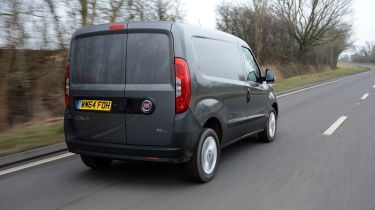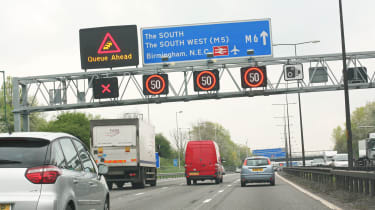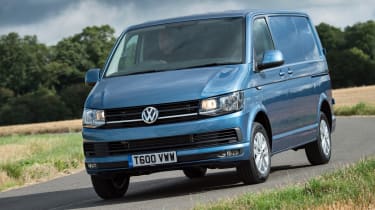Van insurance: how to get the best deal
The best van insurance policy isn’t always the cheapest. Here’s how to get the best deal.

Insurance is an unavoidable outlay when running a van - if you don't have insurance, then you're driving your van illegally. However, while it might be tempting to simply plump for the cheapest insurance cover you can find, that might be a false economy when it comes to the kind of cover that van operators often need.
Van insurance is a bit more involved than car insurance. While you can get the same types of cover - comprehensive, third party, fire & theft or third party-only - that's not the end of the insurance issue. What about covering the cost of any contents, should somebody either break in or steal your van? While a low up-front quote might be attractive, will it really cover these eventualities? Or will you be left out of pocket?
Our useful guide shows you what you need to be looking out for, other than the best price possible.
Decide what kind of van insurance you need
There's more than one type of van insurance, here's how they all work...
Third party van insurance
This is the legal minimum level of insurance that is required for driving on UK roads. As the name suggests, it covers third parties, so if you have an accident, the damage caused to other vehicles is covered, but you are liable for any repairs to your van. It’s usually the cheapest cover option, but not always.

Third party, fire and theft van insurance
This level of insurance cover is similar to third-party only, but it adds the ability to make a claim if your van is damaged by fire, or if it's stolen. Again, any damage that may occur to your van in an accident is not covered by this kind of policy.
Comprehensive van insurance
While comprehensive van insurance is usually more expensive than any other kind of cover, it's the most popular type of insurance that's taken out by van users. What's more, the price difference between fully comp and third party cover is usually far smaller than you think, and is worth the extra outlay for the added peace of mind it provides.
If you depend on your van for work, fully-comp cover makes sense but be warned, not all fully comprehensive van insurance policies are the same.
Know what’s covered by your van insurance policy
As ever with insurance, it pays to read the small print of any potential cover. Just because one policy is more expensive than another, it doesn't necessarily mean it's worse value for money. Look into the details of a policy to see exactly what you get for your money. Below are the extras that may make a more expensive policy worthwhile.

Van insurance policy excess
Most insurance policies have a compulsory excess that the insured will need to pay towards any repairs or reimbursement of stolen property. A higher excess usually means lower monthly premiums, and you can lower them further by adding a voluntary excess on top. It’s a bit of a gamble, because if you do have to make a claim for any reason, then the savings you make on the discount at the start of the policy could be for nothing.
Breakdown and recovery cover
Some insurance policies will include a level of breakdown cover. This can be anything from basic roadside assistance to recovery of a broken-down vehicle.
If your whole business is put on hold by having a van off the road, this could be a useful addition to any policy. That's especially true if you're running a large van. At the other end of the spectrum, you could save some cash here if you don't need breakdown cover with your insurance.
Replacement van
Policies that offer a replacement van as part of the policy can keep your business moving in the event of serious damage to your vehicle. Some insurance policies include a replacement van in the policy, and some offer to supply one within 24 hours of making a claim.
Goods in transit cover
This is an important part of the small print for delivery drivers. A fully comprehensive insurance policy may not cover the contents of your van, so make sure the cover includes a line about ‘goods in transit’ if you regularly carry valuable items that need to be protected in the event of damage or theft. Check the maximum value of the goods in transit cover and adjust this to suit the kind of cargo you carry.
Sign writing and internal modifications
Many vans are custom-built to suit the particular needs of those that use them, but the modifications may not be covered by an insurance policy. If you have signwriting on your vehicle or aftermarket modifications inside, such as specialist lining or storage racking, make sure that these are covered by your policy and declare them when asked about modifications.
Claims management
Time is money for van operators, and the last thing you need is the time lost through an accident or theft from your van compounded by more time wasted sorting out the insurance claim. Many van insurers will run a 24-hour helpline and offer a complete claims management service, but some won’t.
How to get the best van insurance deal
With so much to consider, finding the best van insurance deal at the right price can be tricky, but it’s worth putting the time in to get the level of cover you need.
Shop around
It's the easy option, but simply renewing your van insurance with your current provider won't necessarily be the cheapest option. Price comparison websites make the donkey work of fishing for quotes far easier, although not all the top insurers offer prices on these comparison sites. And with vans, it's important to see if the policies you're comparing match up in terms of their level of cover - don’t just fixate on finding the lowest price possible.
Tell the truth
Being honest when applying for insurance works out, because if you've told fibs, even white lies, they could come back and bite you if you need to make a claim. Be as accurate as you can with details such as where you park the vehicle overnight and the annual mileage you cover.
Hunt for discounts
Insurers offer various discounts on insurance premiums. The obvious one is the no-claims discount, which can significantly reduce the cost of your insurance if you’ve gone some time without making a claim. Some insurers will be able to apply any no-claims discount you may have accrued on a car to your van.
Van operators can also benefit from a multi-vehicle discount if they insure a number of vehicles with the same insurance company.
Tell us about your van insurance successes and nightmares in the comments section below...
Find a car with the experts


